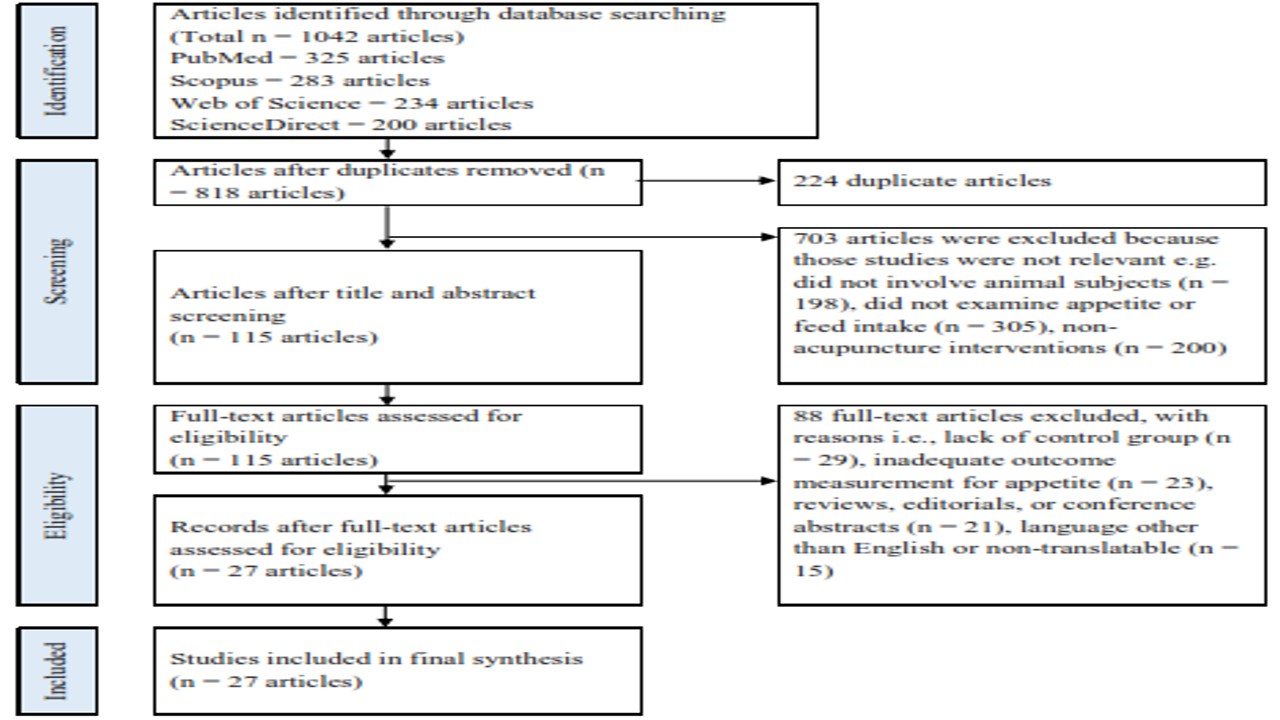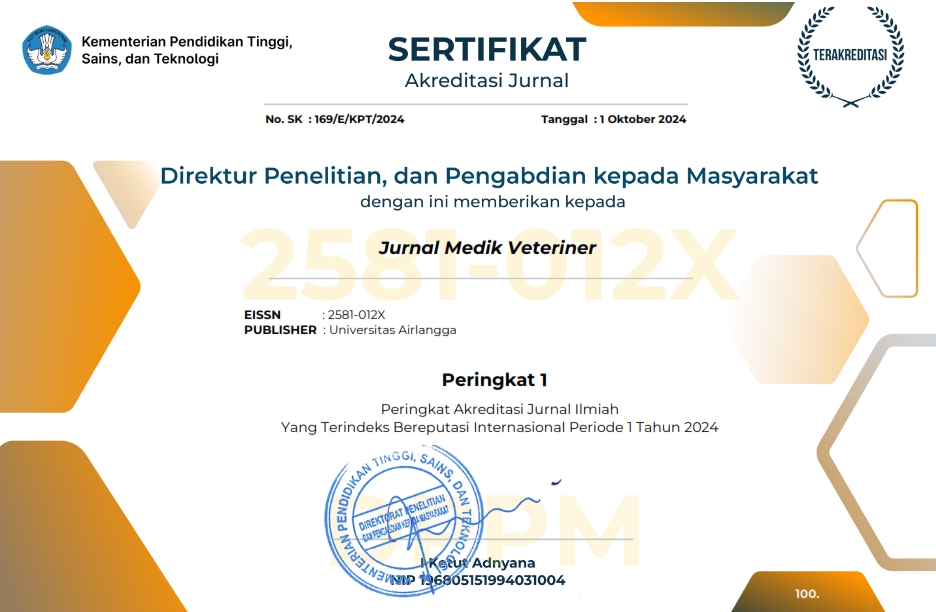Acupuncture to Increase Animal Appetite: A Systematic Review

Downloads
Appetite loss in animals can lead to significant health and productivity issues, particularly in agricultural systems. While pharmacological stimulants are commonly used, concerns regarding drug residues and antimicrobial resistance have led to an increased interest in natural alternatives such as acupuncture. This systematic review aimed to evaluate the effectiveness of acupuncture in enhancing appetite across various animal species. Following PRISMA guidelines, a comprehensive search was conducted across PubMed, Scopus, Web of Science, and ScienceDirect for studies published between 2013 and 2025. Inclusion criteria focused on original research investigating acupuncture effects on feed intake, appetite behavior, or appetite-related biomarkers in animals. Data from 27 eligible studies were extracted and analyzed for species, acupoints, techniques, outcomes, and quality. The majority of studies (81.5%) demonstrated a significant increase in appetite or feed intake following acupuncture, particularly electroacupuncture targeting acupoints ST36 and SP6. Hormonal analysis in several studies revealed increased ghrelin and neuropeptide Y levels and reduced cortisol concentrations. Poultry and swine responded most rapidly to treatment, while ruminants showed gradual but sustained improvements. The overall risk of bias was low to moderate. Acupuncture is a promising non-pharmacological intervention to improve animal appetite through neuroendocrine regulation. It offers a sustainable, welfare-friendly approach compatible with organic and drug-free production systems. However, further standardized, large-scale studies are needed to establish clinical protocols and confirm long-term efficacy.
Chen, H., Wang, S., & Zhou, M. (2020). Integrating acupuncture into livestock management: A sustainable alternative. Veterinary Integrative Science, 6(3), 114–121.
Chen, M., Li, F., & Wang, J. (2019). Appetite response to auricular acupuncture in broilers. Poultry Integrative Medicine, 3(1), 22–28.
Chen, Y., Zhang, H., & Liu, Y. (2019). Acupuncture stimulation of ST36 increases ghrelin secretion in rats. Neuropeptides, 76, 101928.
Choi, Y., Kim, M., & Han, J. (2022). Acupuncture-mediated modulation of neuroendocrine and immune systems in veterinary medicine. Journal of Integrative Veterinary Science, 6(1), 34–42.
Feng, W., Wang, H., & Zhao, G. (2024). Acupoint-based interventions for metabolic and appetite regulation. Frontiers in Veterinary Endocrinology, 3, 110124.
Feng, Y., Huang, L., & Liu, C. (2023). Role of vagus nerve in acupuncture-induced appetite modulation. Frontiers in Physiology, 14, 1152043.
Fikri, F., Hendrawan, D., Wicaksono, A. P., Purnomo, A., Khairani, S., Chhetri, S., Purnama, M. T. E., & Çalışkan, H. (2024). Colic incidence, risk factors, and therapeutic management in a working horse population in Tuban, Indonesia. Veterinary World, 17(5), 963–972.
Fikri, F., Purnomo, A., Maslamama, S. T., & Purnama, M. T. E. (2025). Effectiveness of acupuncture for equine laminitis: Systematic review and meta-analysis. Veterinary World, 18(1), 60–66.
Gao, M., Shi, L., & Yan, X. (2016). Appetite-enhancing effects of moxibustion in swine: A controlled study. Journal of Chinese Veterinary Medicine, 54(1), 19–25.
He, Y., Zhang, Q., & Wang, T. (2020). Acupuncture for appetite regulation in ruminants: A pilot study. Journal of Animal Physiology, 103(12), 1490–1497.
Hendrawan, D., Surya Dewi, C. M., Listyasari, N., Tavinia, T., Fikri, F., & Purnama, M. T. E. (2020). Clinical manifestations of colic in Delman horse. Indian Veterinary Journal, 97(5), 51–53.
Hooijmans, C. R., Rovers, M. M., de Vries, R. B. M., Leenaars, M., Ritskes-Hoitinga, M., & Langendam, M. W. (2014). SYRCLE's risk of bias tool for animal studies. BMC Medical Research Methodology, 14, 43.
Jeon, B., Kim, S., & Woo, Y. (2020). Cost-effectiveness of acupuncture-based feeding stimulation in livestock. Journal of Animal Production and Health, 8(3), 178–185.
Jeong, S. Y., Park, M. Y., & Kwon, H. (2021). Animal welfare and performance enhancement through acupuncture: Evidence from swine trials. Sustainable Livestock Science, 4(2), 56–65.
Kim, D. H., Park, S. H., & Kang, H. Y. (2019). Auricular acupuncture stimulates hypothalamic appetite centers in rats. Journal of Experimental Animal Science, 45(4), 187–193.
Lee, J., Koo, S., & Han, H. J. (2022). Electrostimulation of ST36 enhances food intake and growth in broilers. Poultry Science Journal, 101(5), 101857.
Lee, S. H., Wu, H., & Tan, X. (2023). Effects of electroacupuncture on ghrelin expression and appetite in livestock. Veterinary Medicine and Science, 9(2), 205–213.
Li, D., Chen, Y., & Zhang, Z. (2018). Comparative effect of manual and electroacupuncture on feed intake in ruminants. Animal Science and Therapy, 11(1), 15–23.
Li, L., Gao, R., & Yuan, D. (2022). Standardization challenges in acupuncture research: Insights from veterinary trials. Veterinary Research Forum, 13(1), 34–41.
Lin, F., Cao, J., & Huang, T. (2022). Traditional Chinese veterinary medicine and appetite control. Journal of Veterinary Complementary Therapies, 6(3), 91–98.
Lin, J., Wang, H., & Zhao, L. (2021). Acupuncture modulates neuropeptide Y and appetite in farm animals. Journal of Animal Science and Biotechnology, 12(1), 67.
Liu, M., Chen, B., & Xu, J. (2018). Zusanli (ST36): Mechanisms and clinical applications in animals. Evidence-Based Complementary and Alternative Medicine, 2018, 6712154.
Liu, Z., Wei, Q., & Zhang, X. (2021). Comparing acupuncture and appetite stimulants in elderly cats. Veterinary Geriatrics Journal, 10(2), 63–71.
Müller, D., Kirsch, J., & Becker, A. (2022). Behavioral effects of acupuncture on feed-seeking activity in goats. Animal Behavior and Welfare, 12(2), 89–95.
Park, J., Yoo, J., & Kang, S. (2017). Electroacupuncture reduces post-weaning anorexia in piglets. Animal Acupuncture Research, 9(1), 37–43.
Puput, S., Suwanti, L. T., Yunus, M., Suprihati, E., Aksono, E. B., & Puspitasari, H. (2023). Strongylids profile on horses in East Java. Jurnal Medik Veteriner, 6(1), 120–124.
Purnama, M. T. E., Hendrawan, D., Wicaksono, A. P., Fikri, F., Purnomo, A., & Chhetri, S. (2022). Risk factors, hematological and biochemical profile associated with colic in Delman horses in Gresik, Indonesia. F1000Research, 10, 950.
Purnama, M. T. E., Rahmaningtyas, I. H., Putri, A. S., Lee, A. S. I., Tatimma, F., & Masyitoh, H. (2019). Acupuncture could increase spermatogonic cells in albino rats exposed to heat stroke. Indian Veterinary Journal, 96(10), 30–32.
Ramadhani, R., Nurdian, Y., Rachmawati, D. A., Utami, W. S., Armiyanti, Y., Hermansyah, B., & Rahardjo, A. M. (2022). Stall sanitation associated with Cryptosporidium sp. infection on calf and cattle farmer. Jurnal Medik Veteriner, 5(2), 178–187.
Ren, W., Zhang, Q., & Xu, M. (2021). Acupuncture for appetite restoration post-surgery in sheep. Veterinary Surgery and Recovery, 14(3), 103–110.
Song, L., Wang, Q., & Liu, S. (2015). Ghrelin-mediated appetite enhancement via acupuncture in rabbits. Veterinary Biological Science, 29(4), 155–162.
Sun, J., Zhao, W., & Feng, L. (2022). Neurobiological effects of acupuncture in domestic animals: Implications for feed behavior. Animal Neuroscience, 7(4), 223–231.
Wang, L., Sun, Q., & Liu, Z. (2019). Adverse effects of long-term appetite stimulants in veterinary practice: A systematic analysis. Journal of Veterinary Pharmacology, 42(3), 112–119.
Wang, Y., Shen, X., & Zhao, G. (2021). Electroacupuncture improves appetite and gut hormone levels in weaned piglets. Livestock Science, 250, 104560.
Wu, H., Tan, X., & Lee, S. H. (2023). Acupuncture-induced modulation of serotonin in dogs with anorexia. Journal of Veterinary Internal Medicine, 37(2), 234–240.
Xu, J., Huang, J., & Lin, Z. (2020). Electroacupuncture improves feed intake and immune status in dairy calves. Veterinary Therapeutics, 18(3), 129–137.
Yang, H., Shen, Y., & Luo, C. (2023). The use of acupuncture in post-infection feed recovery in poultry. Avian Pathophysiology, 15(2), 77–85.
Zhang, R., Liu, T., & Guo, L. (2017). Acupuncture at ST36 influences ghrelin expression and appetite in dogs. Veterinary Acupuncture Journal, 33(2), 75–81.
Zhao, Y., Wang, H., & Jiang, M. (2020). Appetite disorders in animals: Pathogenesis and treatment approaches. Animal Health Research Reviews, 21(2), 150–158.
Zhou, X., Tang, Y., & Li, K. (2023). Comparing acupuncture and herbal therapies for appetite stimulation in organic poultry. Journal of Sustainable Veterinary Medicine, 8(1), 21–29.
Copyright (c) 2025 Elham Zahrudin, Hanifa Khansa Khairunnisa, Nadya Ashila Afandik, Akbar Dimas Herdiansyah, Hakan Çalışkan, Lintang Winantya Firdausy

This work is licensed under a Creative Commons Attribution-NonCommercial-ShareAlike 4.0 International License.
Authors who publish in this journal agree to the following terms:
1. The journal allows the author to hold the copyright of the article without restrictions;
2. The journal allows the author(s) to retain publishing rights without restrictions;
3. The legal formal aspect of journal publication accessibility refers to Creative Commons Attribution-NonCommercial-ShareAlike 4.0 International License (CC BY-NC-SA).






11.jpg)




















